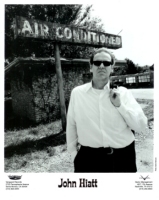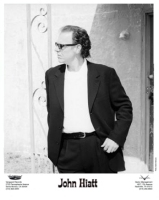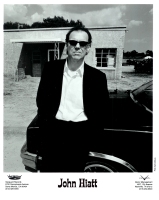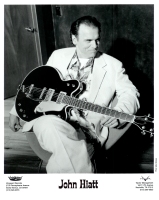|
An inventive performer and
poignant songwriter, John Hiatt has captured and held the attention
of audiences and critics alike with his distinctive voice and varied
styles. In a career that has now spanned more than 25 years, he has
dabbled in rock, acoustic, folk, new wave and Mississippi Delta
blues.
While developing his own
signature sound through the years, John Hiatt has attracted performers
from all over the musical map to his catalog—his songs having been covered
in almost every conceivable style. Artists who have interpreted one more
Hiatt-penned tunes include Bob Dylan, The Everly Brothers, Joe Cocker,
Three Dog Night, Conway Twitty, Iggy Pop, The Neville Brothers, Jewel,
Emmylou Harris, Paula Abdul, Don Henley and Ronnie Milsap.
In 1974, Hiatt’s song “Sure
As I’m Sittin’ Here” became a Top 20 hit for Three Dog Night. Later, The
Jeff Healey Band’s version of “Angel Eyes” became a Top 5 hit for the
guitar player. In 1989 Bonnie Raitt’s cover of “Thing Called Love” became
a mega-hit and most recently, the B. B. King/Eric Clapton album Riding
with the King was awarded a Grammy (Best Traditional Blues Album) on
the strength of John's title track. Nominated for a Grammy himself in 2001
(Best Contemporary Folk Album) with his most recent album, Crossing
Muddy Waters, he was named artist/songwriter of the year at the
Nashville Music Awards in 2000.
With complex characters,
artful lyrics, pointed hooks and haunting melodies, The Tiki Bar is
Open is the latest in his long line of classic albums. Yet his
performance on each track proves that ultimately, they are distinctly his
own. Hiatt’s voice, raw and playful on "Everybody Went Low," or hushed and
repentant on "Come Home to You," is able to bring all these songs, in all
their diversity, to life.
As the author of the words
that other artists flood to interpret, John Hiatt has the unique ability
to follow his own advice and truly let his music speak for
itself."
It is in Hiatt's nature to
share credit for his work. And, as John admits, the band on Tiki
Bar is about as perfectly suited to his performance and material as a
band can be. Guitarist Sonny Landreth, bassist Dave Ranson, and drummer
Kenneth Blevins have a long track record with Hiatt, and on Tiki Bar
they show the years haven't dulled their skill of locking onto a
groove and connecting to every nuance in his music.
Hiatt put the Goners together
for the first time in 1988 for his Bring the Family tour. "I found
Sonny through my old friend, Big Ray [Benson] from Asleep at the
Wheel," he says. "Ray knew that Ry was the slide player on that album,
so he called me and said, 'There's a guy down in Beaux Bridge,
Louisiana—and he's the other slide player.'" That's all Hiatt needed to
hear, especially since Landreth brought Ranson and Blevins with him as his
rhythm section, fully formed and ready to roll.
"We toured for about a year,
and we made Slow Turning together," Hiatt continues. "Then we kind
of drifted apart for no particular reason, other than we were done for the
time being. It took us about eleven years to get back together, mainly
just to have some fun and play some shows. Then we wound up making this
record."
With a few extra guitar and
keyboard parts contributed by producer Jay Joyce ("we call him an Honor
Goner," Hiatt deadpans), and background vocals by Julie Miller, the
reunited Goners lost no time in tackling these new songs. Joyce, whose
production credits include Patty Griffin, Lisa Germano and the soundtrack
for Reservoir Dogs, paired with Niko Bolas, who earned his
engineering chops through sessions with everybody from Neil Young and
Melissa Etheridge to Frank Sinatra and Spinal Tap.
From first note to final
fade, Tiki Bar offers a kaleidoscopic tumble of insights into
Hiatt. "My Old Friend," the album's first single, stems from his
exasperation with, as he puts it, "running into women I'd gone to high
school with. Inevitably, they'd look fantastic. They'd be in great health,
great spirits, and so on. And I'd be feeling like shit. So," he laughs,
"this is my answer to that." In typical Hiatt fashion, Hiatt added an
obscure nugget of pop-culture. Within this song’s amiable, insistent beat
and crunchy guitars he has hidden what will surely be the only reference
soon heard to Aqualung.
Another upbeat highlight,
"Everybody Went Low," grabs listeners with an acoustic guitar lick that
won't let go for days. "I picked up a twelve-string guitar one day and
just started playing that two-chord jag," Hiatt says. "The subject matter
was that phenomenon where people can inexplicably bring themselves and the
people around them down at the same time -- like a whirlpool. Musically,
though, I was just trying to write a song with two chords. Unfortunately,"
he chuckles, "I couldn't make it all the way. I had to come up with a
bridge."
Following "Everybody Went
Low" is "Hangin' Round Here," on which Hiatt and his crew uncannily
resurrect the sound of an immortal North American band. "I hit thirteen or
fourteen when I discovered Bob Dylan, and all of a sudden I wanted to
abandon rock and roll and become a folk troubadour," he says. "So suddenly
I had this split in my musical personality; I kept going back and forth.
It took the Band to bring that split together."
Hiatt's singing and Blevins'
drumming are a conscious tribute on this track to Levon Helm. "He's a
god," is how Hiatt puts it. "A wonderful man too. Richard Manuel was a
hero as well -- that permanent hurtin' sound. And on the last record they
put out, I did a duet with Rick Danko on a song of mine, 'Bound By Love.'
When I think about that now, well, it's about enough to make me
cry."
Much of Tiki Bar is
about looking back from a summit of life experience. "All the Lilacs in
Ohio" matches a stomping, up-tempo beat with images of an idyllic time,
juxtaposed against more immediate "city streets with the dirty winter
snow." Typically, Hiatt built this story from a surprising source of
inspiration -- yet one that makes sense to the creative temperament. "One
of my favorite old movies is Lost Weekend," he explains. "At one point Ray Milland is trying to write the great love story, and he can't. He's
talking with Joe, the bar guy, about how hard it is to write about love.
It's the details that are so hard to get right. He says, 'You know, you're
gonna meet her for lunch, but she sends you a note that she can't meet you
after all. You open it up
-- and it smells like all the lilacs in Ohio.'"
Typically again, Hiatt pulls
back a bit. "I totally stole that, so really this is more that character's
story than mine—although I do connect with the drunken writer
too."
There are demons in Hiatt's
past, and at several places throughout Tiki Bar they return just
long enough to transform some memory into a song, and leave again. So it
is on "Something Broken," whose poetry lives in its simplicity and
unadorned, confessional language. "I wrote that song in Amsterdam, in the
spring of '99," Hiatt says. "I'd been staying in this hotel right on Dam
Square, which is where all the whores and drug dealers hang out. Having
that under my window every night had an effect on me. I thought about my
own past, which was rife with drugs and wacked-out sexual escapades; it
brought all that back to me, right there in Amsterdam."
There are memories of
memories as well—of a fascination with a place that seemed like a vision
of Oz at the time, and which exists now as an important part of Hiatt's
life. "When I was a kid, when you uttered the words 'Daytona Beach,' it
was like you were talking about 'my sweet Abyssinian home.' It was all
about the hot-rod culture, the beach, the tiki vibe. That was Daytona
Beach when I was a kid -- but I never got there. But nowadays I know it
well; I race there every year at the Bolusia County Speedway. And it's
still an amazing place. There's a kind of Americana there that hasn't been
homogenized all to hell.
"So I was coming back up to
my hotel on the beach one night, after a race. I just drove by one of
those hundreds of Mom-and-Pop motels, and there was this pitiful little
one with a sign that said, 'Tiki Bar Is Open.' And I thought, 'Well, thank
God!' I don't drink, but I'm sure that was a sight for many sore eyes. And
for me, the Tiki Bar being open means that Daytona Beach is still
there."
The last track, "Farther
Star," is an almost startling finale—an almost trippy bit of psychedelia.
Beneath its surface lies a tribute to Hiatt's sister-in-law Mary, who
succumbed to breast cancer several years ago. During a visit to her farm
in northern California, he spoke with Mary and her friend Jill about Alcools, a collection of poems written by Guillaume Appolinaire that he
had been reading. He gave the book to Jill, who began reading aloud from
one of its works, "The Bridge at Mirabeau." A phrase from that poem,
referring to "farther stars," now evokes that night, as Hiatt's own words
remember in their own way: "Death's a truth, but death's a lie. Love is
your only alibi. Mary, you'll forget this soon, where we were and when we
sang this tune."
There's much more to Tiki
Bar. Some of it Hiatt didn't want to discuss too much—"Come Home to
You," with its references to a childhood of neglect and a protagonist who
has "a meanness inside him," prompts him to say only, "I think I was
copping to 'cast not the first stone.' We're all pretty nasty pieces of
work, but we're all capable of being redeemed."
Ultimately, he is right in
letting the music speak for itself. Through plaintive lyrics that stem
from complex thought, Tiki Bar makes it clear that with John Hiatt
at the mic, these great songs grow greater still. |









